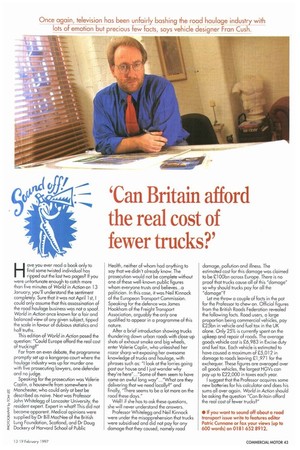'Can Britain afford the real cost of fewer trucks?'
Page 55

If you've noticed an error in this article please click here to report it so we can fix it.
Have you ever read a book only to find some twisted individual has ripped out the last two pages? If you were unfortunate enough to catch more than five minutes of World in Action on 13 January, you'll understand the sentiment completely. Sure that it was not April 1st, I could only assume that this assassination of the road haulage business was not a spoof. World in Action once known for a fair and balanced view of any given subject, tipped the scale in favour of dubious statistics and half truths.
This edition of World in Action posed the question: "Could Europe afford the real cost of trucking?"
For from an even debate, the programme promptly set up a kangaroo court where the haulage industry was up for murder one with five prosecuting lawyers, one defender and no judge. Speaking for the prosecution was Valerie Caplin, a housewife from somewhere in Manchester, who could only at best be described as naive. Next was Professor John Whitelegg of Lancaster University the resident expert. Expert in what? This did not become apparent. Medical opinions were supplied by Dr Bill MacNee of the British Lung Foundation, Scotland, and Dr Doug Dockery of Harvard School of Public Health, neither of whom had anything to say that we didn't already know. The prosecution would not be complete without one of these well-known public Figures whom everyone trusts and believes.. .a politician. In this case, it was Neil Kinnock of the European Transport Commission. Speaking for the defence was James Hookham of the Freight Transport Association, arguably the only one qualified to appear in a programme of this nature.
After a brief introduction showing trucks thundering down urban roads with close-up shots of exhaust smoke and big wheels, enter Valerie Caplin, who unleashed her razor sharp wit exposing her awesome knowledge of trucks and haulage, with phrases such as: "I look at the lorries going past our house and I just wonder why they're here"..."Some of them seem to have come an awful long way". .."What are they delivering that we need locally?" and Finally, "There seems to be a lot more on the road these days." Well! if she has to ask these questions, she will never understand the answers.
Professor Whitelegg and Neil Kinnock were under the misapprehension that trucks were subsidised and did not pay for any damage that they caused, namely road damage, pollution and illness. The estimated cost for this damage was claimed to be £100bn across Europe. There is no proof that trucks cause all of this "damage" so why should trucks pay for all the "damage"? Let me throw a couple of facts in the pot for the Professor to chew on. Official Figures from the British Roads Federation revealed the following facts. Road users, a large proportion being commercial vehicles, pay £251Dn in vehicle and fuel tax in the UK alone. Only 25% is currently spent on the upkeep and repair of roads. The average goods vehicle cost is £6,983 in Excise duty and Fuel tax. Each vehicle is estimated to have caused a maximum of £5,012 in damage to roads leaving £1,971 for the exchequer. These figures are averaged over all goods vehicles, the largest HGVs can pay up to 222,000 in taxes each year. I suggest that the Professor acquires some new batteries for his calculator and does his sums all over again. World in Action should be asking the question "Can Britain afford the real cost of fewer trucks?"












































































































